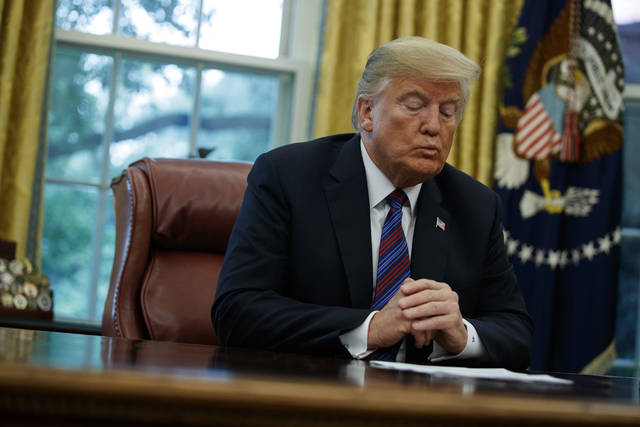U.S., Mexico tentatively set to replace NAFTA with new deal

ASSOCIATED PRESS
President Donald Trump talks on the phone with Mexican President Enrique Pena Nieto in the Oval Office of the White House in Washington today. Trump is announcing a trade “understanding” with Mexico that could lead to an overhaul of the North American Free Trade Agreement. Trump made the announcement in the Oval Office, with Mexican President Enrique Pena Nieto joining by speakerphone.
WASHINGTON >> The Trump administration and Mexico have reached a preliminary accord to replace the North American Free Trade Agreement with a new deal that would be intended to encourage more manufacturing in the United States.
At the same time, President Donald Trump threatened to keep Canada, the third member of NAFTA, out of any new trade agreement. In announcing the tentative accord today at the White House, Trump said a new pact would be called “the United States-Mexico Trade Agreement.”
Trump said he was open to including Canada — “if they’d like to negotiate fairly.” He threatened to impose new taxes on Canadian auto imports to intensify pressure on Ottawa to a agree to deal to Trump’s liking.
Canada’s NAFTA negotiator, Foreign Minister Chrystia Freeland, is cutting short a trip to Europe to fly to Washington Tuesday to try to restart talks.
“We will only sign a new NAFTA that is good for Canada and good for the middle class,” said Adam Austen, a spokesman for Freeland, adding that “Canada’s signature is required.”
“There is still a great deal of uncertainty .. trepidation, nervousness — a feeling that we are on the outside looking in,” said Peter MacKay, a former Canadian minister of justice, defense and foreign affairs who is now a partner at the law firm Baker McKenzie.
Don't miss out on what's happening!
Stay in touch with breaking news, as it happens, conveniently in your email inbox. It's FREE!
Trump has frequently condemned the 24-year-old NAFTA trade pact as a job-killing “disaster” for American workers. Yet the preliminary agreement announced Monday is far from final. Even after being formally signed, it would have be ratified by lawmakers in each country.
The U.S. Congress wouldn’t vote on it until next year — after November midterm elections that could end Republican control of the House of Representatives.
“There are still a lot of questions left to be answered,” MacKay said. He noted, for example, that Trump said nothing Monday about dropping Trump’s tariffs on Mexican or Canadian steel — tariffs that were imposed in part to pressure those countries to reach an agreement on NAFTA.
But at least initially, it looks like at least a tentative public-relations victory for Trump, the week after his former campaign manager was convicted on financial crimes and his former personal attorney implicated him in hush money payments to two women who say they had affairs with Trump.
Over the weekend, U.S. and Mexican negotiators worked to narrow their differences, capping talks that had begun a year ago and have proved highly contentious.
The Office of the U.S. Trade Representative said today that Mexico had agreed to ensure that 75 percent of automotive content be produced within the trade bloc (up from a current 62.5 percent) to receive duty-free benefits and that 40 percent to 45 percent be made by workers earning at least $16 an hour. Those changes are meant to encourage more auto production in the United States.
For months, the talks were held up by the Trump administration’s insistence on a “sunset clause”: A renegotiated NAFTA would end after five years unless all three countries agreed to continue it. Mexico and Canada considered that proposal a deal-killer.
Today, the Trump administration and Mexico announced a compromise on that divisive issue: An overhauled NAFTA would remain in force for 16 years. After six years, the countries would review the agreement and decide whether it needed to be updated or changed. They then would either agree to a new 16-year deal or the pact would expire.
Critics quickly denounced the prospect of cutting Canada out the North American trade pact. Many manufacturers have built complex but vital supply chains that cross all three NAFTA borders.
And there are political reasons to keep Canada inside the regional bloc: “Mexico will have a difficult time selling ‘Trump’s deal’ back home if Canada does not think it is a good deal,” said Daniel Ujczo, a trade attorney with Dickinson Wright PLLC. “It will appear that Mexico caved.”
In fact, the announcement immediately ran into pushback in Mexico.
“To obtain an agreement with Trump, the government of Mexico turned its back on a friend nation, Canada,” Mexican analyst and columnist Alejandro Hope said on Twitter. “I hope it has been worth it, a maneuver that, to put it politely, does not do us honor.”
The No. 2 Senate Republican, John Cornyn of Texas, hailed Monday’s news as a “positive step” but said Canada needs to be party to a final deal. “A trilateral agreement is the best path forward,” he said, adding that millions of jobs are at stake.



